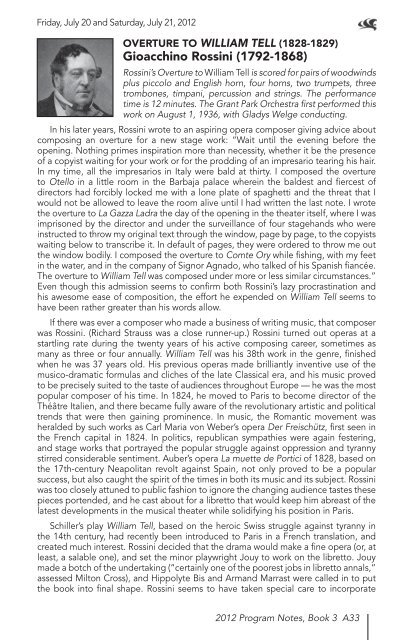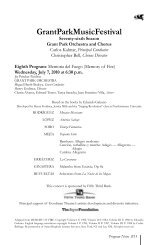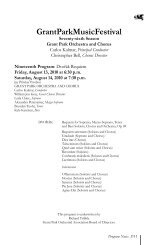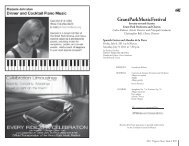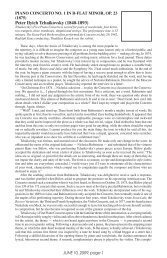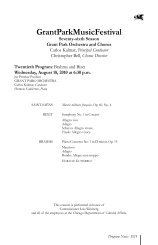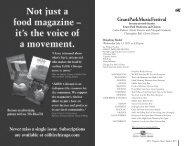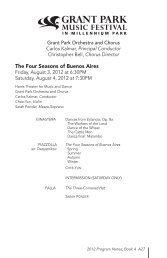rossini's Stabat Mater - The Grant Park Music Festival
rossini's Stabat Mater - The Grant Park Music Festival
rossini's Stabat Mater - The Grant Park Music Festival
You also want an ePaper? Increase the reach of your titles
YUMPU automatically turns print PDFs into web optimized ePapers that Google loves.
Friday, July 20 and Saturday, July 21, 2012<br />
Overture to William Tell (1828-1829)<br />
Gioacchino Rossini (1792-1868)<br />
Rossini’s Overture to William Tell is scored for pairs of woodwinds<br />
plus piccolo and English horn, four horns, two trumpets, three<br />
trombones, timpani, percussion and strings. <strong>The</strong> performance<br />
time is 12 minutes. <strong>The</strong> <strong>Grant</strong> <strong>Park</strong> Orchestra first performed this<br />
work on August 1, 1936, with Gladys Welge conducting.<br />
In his later years, Rossini wrote to an aspiring opera composer giving advice about<br />
composing an overture for a new stage work: “Wait until the evening before the<br />
opening. Nothing primes inspiration more than necessity, whether it be the presence<br />
of a copyist waiting for your work or for the prodding of an impresario tearing his hair.<br />
In my time, all the impresarios in Italy were bald at thirty. I composed the overture<br />
to Otello in a little room in the Barbaja palace wherein the baldest and fiercest of<br />
directors had forcibly locked me with a lone plate of spaghetti and the threat that I<br />
would not be allowed to leave the room alive until I had written the last note. I wrote<br />
the overture to La Gazza Ladra the day of the opening in the theater itself, where I was<br />
imprisoned by the director and under the surveillance of four stagehands who were<br />
instructed to throw my original text through the window, page by page, to the copyists<br />
waiting below to transcribe it. In default of pages, they were ordered to throw me out<br />
the window bodily. I composed the overture to Comte Ory while fishing, with my feet<br />
in the water, and in the company of Signor Agnado, who talked of his Spanish fiancée.<br />
<strong>The</strong> overture to William Tell was composed under more or less similar circumstances.”<br />
Even though this admission seems to confirm both Rossini’s lazy procrastination and<br />
his awesome ease of composition, the effort he expended on William Tell seems to<br />
have been rather greater than his words allow.<br />
If there was ever a composer who made a business of writing music, that composer<br />
was Rossini. (Richard Strauss was a close runner-up.) Rossini turned out operas at a<br />
startling rate during the twenty years of his active composing career, sometimes as<br />
many as three or four annually. William Tell was his 38th work in the genre, finished<br />
when he was 37 years old. His previous operas made brilliantly inventive use of the<br />
musico-dramatic formulas and cliches of the late Classical era, and his music proved<br />
to be precisely suited to the taste of audiences throughout Europe — he was the most<br />
popular composer of his time. In 1824, he moved to Paris to become director of the<br />
Théâtre Italien, and there became fully aware of the revolutionary artistic and political<br />
trends that were then gaining prominence. In music, the Romantic movement was<br />
heralded by such works as Carl Maria von Weber’s opera Der Freischütz, first seen in<br />
the French capital in 1824. In politics, republican sympathies were again festering,<br />
and stage works that portrayed the popular struggle against oppression and tyranny<br />
stirred considerable sentiment. Auber’s opera La muette de Portici of 1828, based on<br />
the 17th-century Neapolitan revolt against Spain, not only proved to be a popular<br />
success, but also caught the spirit of the times in both its music and its subject. Rossini<br />
was too closely attuned to public fashion to ignore the changing audience tastes these<br />
pieces portended, and he cast about for a libretto that would keep him abreast of the<br />
latest developments in the musical theater while solidifying his position in Paris.<br />
Schiller’s play William Tell, based on the heroic Swiss struggle against tyranny in<br />
the 14th century, had recently been introduced to Paris in a French translation, and<br />
created much interest. Rossini decided that the drama would make a fine opera (or, at<br />
least, a salable one), and set the minor playwright Jouy to work on the libretto. Jouy<br />
made a botch of the undertaking (“certainly one of the poorest jobs in libretto annals,”<br />
assessed Milton Cross), and Hippolyte Bis and Armand Marrast were called in to put<br />
the book into final shape. Rossini seems to have taken special care to incorporate<br />
2012 Program Notes, Book 3 A33


